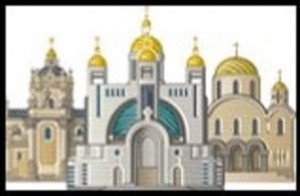 I would continue to share thoughts about Sacred Tradition since our Church adheres to Sacred Tradition for two reasons: from its foundation it has based its beliefs on the canons of the Seven Ecumenical Councils and because it is a part of the Catholic Communion of Churches. It is the presence of the Holy Spirit within the Church which allows her to formulate doctrine. The Christian with an Eastern disposition would never propose a view of continuous revelation where Scriptural truths grow in quantity. Sacred Tradition is not a supplement to Revelation. Tradition simply encourages a process whereby the Church, led by the Holy Spirit, can better defend and understand the basic Christian doctrines which she already possesses. New revelations are not added. Christian doctrine is never altered. But rather, Divine Tradition is a light turned on in the room of our Chris-tian experience.
I would continue to share thoughts about Sacred Tradition since our Church adheres to Sacred Tradition for two reasons: from its foundation it has based its beliefs on the canons of the Seven Ecumenical Councils and because it is a part of the Catholic Communion of Churches. It is the presence of the Holy Spirit within the Church which allows her to formulate doctrine. The Christian with an Eastern disposition would never propose a view of continuous revelation where Scriptural truths grow in quantity. Sacred Tradition is not a supplement to Revelation. Tradition simply encourages a process whereby the Church, led by the Holy Spirit, can better defend and understand the basic Christian doctrines which she already possesses. New revelations are not added. Christian doctrine is never altered. But rather, Divine Tradition is a light turned on in the room of our Chris-tian experience.
Although the Church of New Testament times was chronologically closer to the “spring of truth”, its placement in history does not mean it “knew and understood the mystery of the Revelation … better and fuller than all subsequent ages”. For example, the formulation of the dogma of the Trinity, a term unknown to St. Paul and the Primitive Church, was not the innovative creation of later Church Fathers. It was simply another attempt at explaining the mystery which the Church from Paul’s time to the present now experiences. One theologian has said:
At every moment of history the Church gives to its members the faculty of knowing the Truth in a fullness that the world cannot contain. It is this mode of knowing the living Truth in the Tradition that the Church defends in its creation of new dogmatic definitions.
The Christian cannot afford to be naïve here. Doctrinal development is a necessity. Christianity’s theological path was not set on automatic pilot from the time of the New Testament and thus incapable of getting off course. Prayer and serious thought were required by the Christian Church to defend her experience before an onslaught of heretical doctrines, and it was these attacks which promoted the Spirit to speak to the Church inspiring the key creedal statements that Christianity has today. Tradition in the doctrinal development of the Church can be explained as “the history of the right choices made by human beings confronted by the prophetic word of God. God continually leads us.
